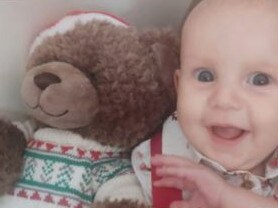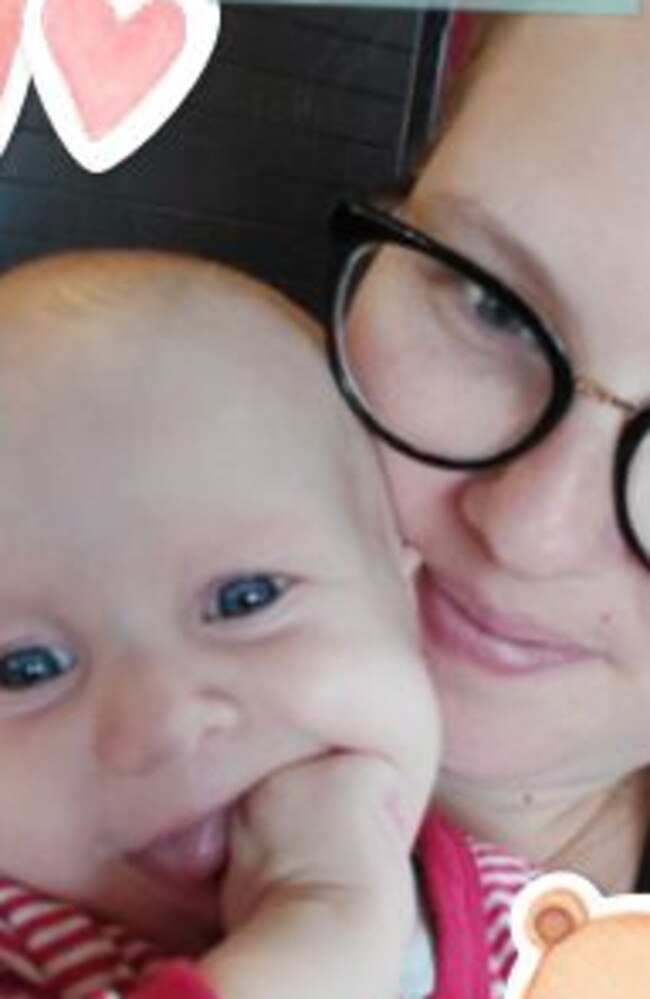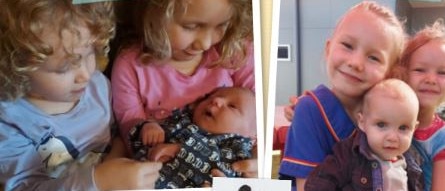Toowoomba mum Rebecca Reed writes letter to son Lachy fighting kidney disease
Looking at photos of little Lachy Reed, you would think he was just like any other 16-month-old baby boy. But the Queensland toddler is in the fight of his short life against a devastating disease. Read his touching story here.
Community News
Don't miss out on the headlines from Community News. Followed categories will be added to My News.
Looking at photos of little Queensland boy Lachy Reed, with his face beside his loving mother’s, or cradled in the arms of his two doting older sisters, you would think he was just like any other 16-month-old baby boy.
But look beyond the photos and you will find that little Lachy will likely never have the same life experiences as his sisters, or the majority of children his age, for that matter.
Lachy’s battle with kidney disease began before he was even born, when his Toowoomba-based parents were told by doctors his kidneys were not functioning the way they should.
Rebecca Reed wrote a letter for Lachy to read one day so he knew just how far he had come in his life, and that while it may take all his strength and will to survive and thrive, his story could help inspire other young Australian children born with kidney disease.
“We first learned you had problems with your kidneys before you were born,” Mrs Reed wrote.
“It was pretty scary and I couldn’t help blaming myself even though it wasn’t anybody’s fault. That’s what mums do.
“Anyway, it was a big moment for Dad and me when we could finally hold you safe in our arms.
“Right from day one, you’ve filled our hearts with love and gratitude.”
It wasn’t until Mrs Reed had Lachy that doctors could definitively confirm with tests that he had cysts on his kidneys.
Mrs Reed didn’t know that young children were susceptible to such severe kidney problems, nor did she know there was no cure for kidney disease.
Kidneys are the internal organs that balance out water, salt, and minerals in your blood.
They remove excess acid created by the body’s cells, get rid of unnecessary fluid and waste, and creates hormones that make bones strong and healthy, control blood pressure, and form red blood cells.
Lachy’s first four months in this world were like any other infant’s.

But soon after, his kidneys decided that they weren’t able to work the way they should without medical treatment.
Mr and Mrs Reed knew Lachy’s kidneys were failing him when his little body started showing physical symptoms.
“He was vomiting, he stopped urinating, and he was barely eating,” Mrs Reed said.
They took their eldest children to their grandparents and then went to the hospital with Lachy.
Lachy and his family spent the next two months in hospital learning unfortunate lessons about what it’s like to have in internal organ that doesn’t work the way a healthy organ does, and the rest of the Reed family is learning the complex nature of what it means to have a functioning set of kidneys as opposed to damaged kidneys.
Lachy is now spending his days at home taking eight different forms of medications, sometimes multiple times throughout the day.
He spends 11 hours every night hooked up to a peritoneal dialysis machine and has regular appointments at the hospital.

According to The Murdoch Children’s Research Institute, kidney disease is largely inherited from genetics, and in many instances the disease-causing mutation is unknown.
This makes both diagnosis and treatment more difficult.
Left untreated, chronic kidney disease may progress into kidney failure, for which there is no cure.
Kidney disease patients are usually treated with dialysis, but a replacement kidney is the best option for some, like Lachy.
Treatment options for chronic kidney disease and kidney failure have advanced little in the past 70 years.
Long-term dialysis can greatly impact the quality of life and may only increase the life of a person with kidney disease by anywhere between five and 10 years.
The waiting period for a replacement kidney in Australia ranges from three to seven years and sadly, some patients die on the kidney transplant list.
He’s not yet two, but in order to even be put on the kidney transplant in Australia, Lachy needs to weigh 10 kilograms to be eligible.
Lachy also needs to live and fight long enough to get the organ he so desperately needs to live.
To help raise awareness of kidney disease and support children just like Lachy, a field of 40 rally cars will complete a marathon Kidney Kar Rally from Cairns to NSW in August.

Mrs Reed’s full letter to Lachy
“To my beautiful, wonderful, amazing boy.
I hope one day when you’re older, you’ll read this letter and feel proud.
Proud of being as brave and strong as a bear. And proud that your story may have helped another child like you and their family feel a little less alone.
We first learned you had problems with your kidneys before you were born.
It was pretty scary and I couldn’t help blaming myself even though it wasn’t anybody’s fault.
That’s what mums do!
Anyway, it was a big moment for dad and me when we could finally hold you safe in our arms.
Right from day one, you’ve filled our hearts with love and gratitude.
It was only a short time later that the test results came through and we learned you had cysts in both your kidneys.
I had no idea that children could have such severe kidney problems, so that was hard to deal with. But nothing like the shock of learning there’s no cure.
As a family, we found strength in each other and everything was going well until you were four months old.
Your kidneys decided ‘Enough!’
During a long spell in hospital, we learned all about peritoneal dialysis and you now have it every night, as well as a whole list of medication during the day.
Sometimes, it’s hard.
I think about the life other babies have, and it’s not like yours.
We’re on a different journey and we need to be strong.
Right now, we’re focusing on keeping you well and happy, and trying to gradually put on weight.
Because as soon as you reach the ten kilo mark, you’ll go on the list for a transplant.
It will take time.
It might not be until you’re two, but we’ll keep going and stay as positive as possible.
My hopes are simple – for you to have the life that you deserve.
Just thinking about it makes me emotional because you deserve happiness, and for every day of your life to be joyful.
As your mum and dad, we started this journey in a hospital room looking at a scan.
But we’re no longer alone.
We have our wonderful family, and we have a whole community around us.
Kidney Health Australia will support us every step of the way.
I can’t believe I’ve got this far without mentioning your sisters who adore you and have given you your name Lachy Bear.
We love you, Lachy Bear!”




